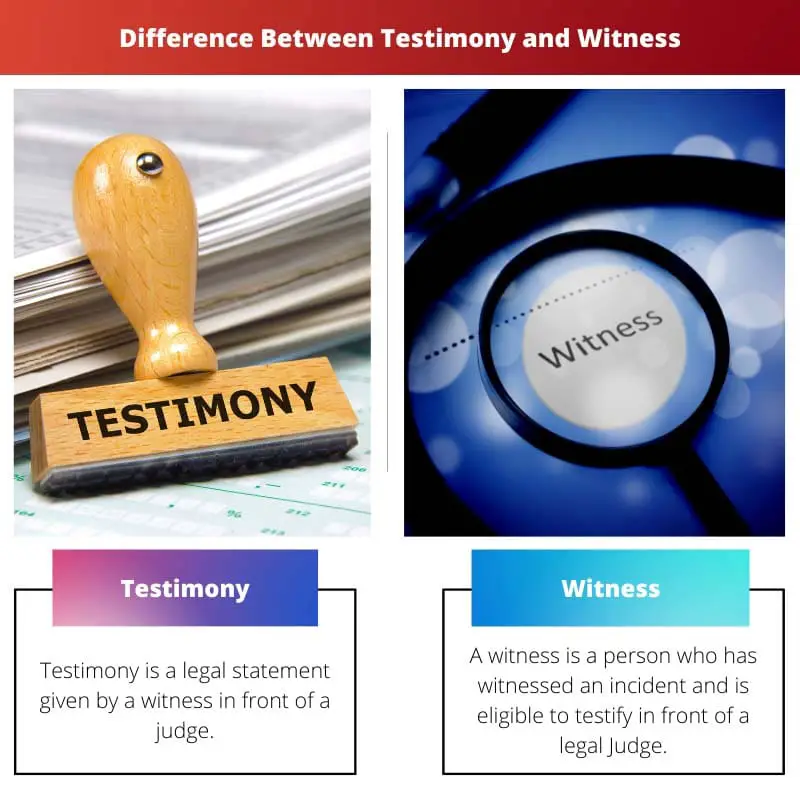Both testimony and witness are legal terms, and this is the only relation they share. However, the word ‘witness’ can be used outside a courtroom as well, while testimony is only a legal term, and it does not become a part of daily vocabulary.
The words have different meanings, and one must not get confused between the two.
Key Takeaways
- Testimony is a formal statement given under oath, in a legal setting, to provide evidence or support for a case.
- A witness is an individual who has firsthand knowledge or experience related to an event or situation and can provide information in a legal context.
- Testimony relies on a person’s credibility and accuracy, while the value of a witness depends on their observations and ability to recall events.
Testimony vs Witness
A witness is a person who provides first-hand knowledge of an event or situation relevant to a case, while testimony is the evidence or information provided by a witness during a court proceeding. A witness provides testimony, but testimony can be presented in other forms, such as written evidence.

Testimony is a legal word that has its roots planted in the Latin language. Testimony is only used in legal issues.
Valid testimony is only given by witnesses. The testimony can have credibility in two ways, one is verbal, and the other is written.
A witness is a person who has seen crimes from close. Someone who has been present at the scene of the crime.
Only a witness is eligible to furnish testimony. However, people at times lie while testifying in front of judges and juries.
Comparison Table
| Parameters of Comparison | Testimony | Witness |
|---|---|---|
| Definition | Testimony is a legal statement given by a witness in front of a judge. | A witness is a person who has witnessed an incident and is eligible to testify in front of a legal Judge. |
| Environment | Testimony happens in a courtroom. | The witness becomes the witness of the crime at the crime scene. |
| Use of term | This word is used only in legal matters. | This word can be used in daily life. |
| Eligibility | Testimony is applicable only by witnesses. | Anyone can be a witness to the circumstances. |
| Gravity | Testimony is a serious matter that decides the results given by the court. | By being a spectator of anything, people become witnesses so its gravity depends on the circumstances. |
What is Testimony?
The word ‘testimony’ has derived from the Latin word ‘testis’. The verb of the word is ‘testify’, and that has the same etymology.
In the field of law, testimony is regarded as a form of evidence, a piece of verbal evidence given by a witness or a group of witnesses.
In most cases, the testimony is verbal as it takes place in a courtroom, in front of a judge, but it can also be written at times.
Testimony is a true statement given by a witness or a group of witnesses. By giving testimony, the witness declares the facts and gives the true statements.
Before giving the statement, the witness needs to take an oath under a penalty in front of a jury. In the case of written testimony, too, all the witnesses are required to give valid testimony.
What is Witness?
The witness is also a legal word, but it is used widely even outside law. A witness is a person who has been present at the scene of the crime.
A witness is a person who is supposed to testify; give a statement in front of the judge. This testimony by witnesses can be voluntarily, and in a few cases, it can be under compulsion as well.
Witnesses are also called eyewitnesses. Not only in law, but the word also gets used in general terms.
Outside the law, witnesses will mean spectating or observing something. For example, “I witnessed a mesmerising dance performance yesterday”.
But when it has to be used in legal spaces, the word will get used like this – ‘I have witnessed the murder’.
Testimony of the witness holds more power than circumstantial evidence. However, the witness can be fake, and they can also lie due to different reasons.
Testimony can be meaningless, too, due to misunderstandings.
Nevertheless, people are supposed to be honest with their inner self and to the country as well. The witness can be more than one, and when more than one witness is available, the chances of unjust become fewer.
Main Differences Between Testimony and Witness
- Testimony is a word that does not get used in everyday life. It is a legal term, and it means a legal statement. This statement can be only given by witnesses, and this happens in front of a judge. A witness, on the other hand, is a person who has been the spectator of some incident.
- The term testimony is a purely legal term, and people do not use this regularly, but the witness is a term that is part of legal vocabulary but can be used in general as well. It is a colloquial term.
- We can say that all testimonies are given by witnesses, but not all witnesses give their testimony or testify in front of a judge.
- Testimony takes place in a courtroom, in front of a judge. But the witness becomes a witness by being present at the crime scene.
- Testimony is relevant only if it is given by witnesses, but any person can be a witness for any sort of circumstances.
- Testimony is a grave matter as the verdict of a case depends on it but being an observer of some incident is not a grave thing. We do it every day. If the incident is a crime, then it becomes a serious matter.

